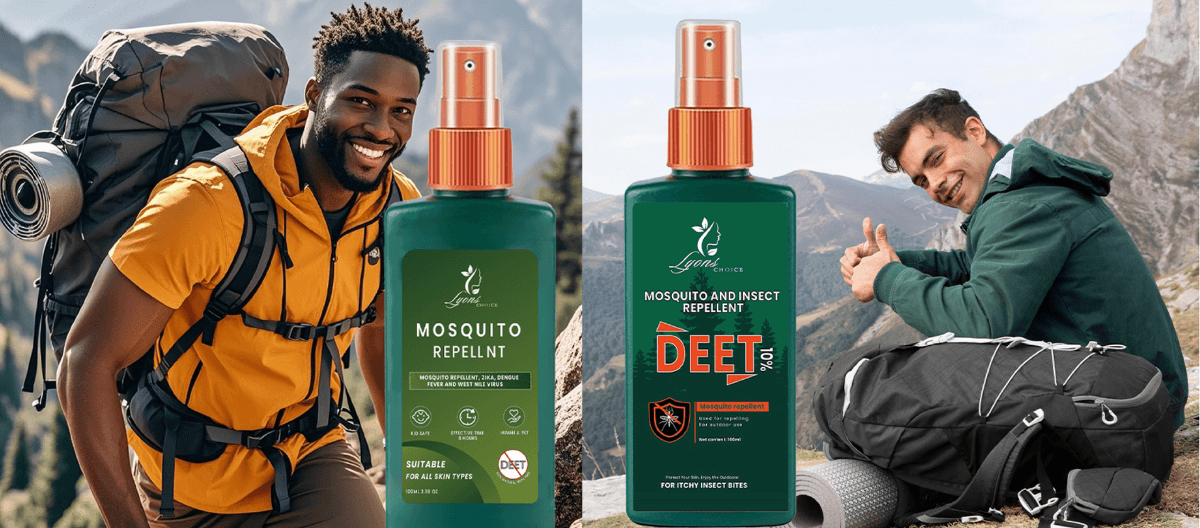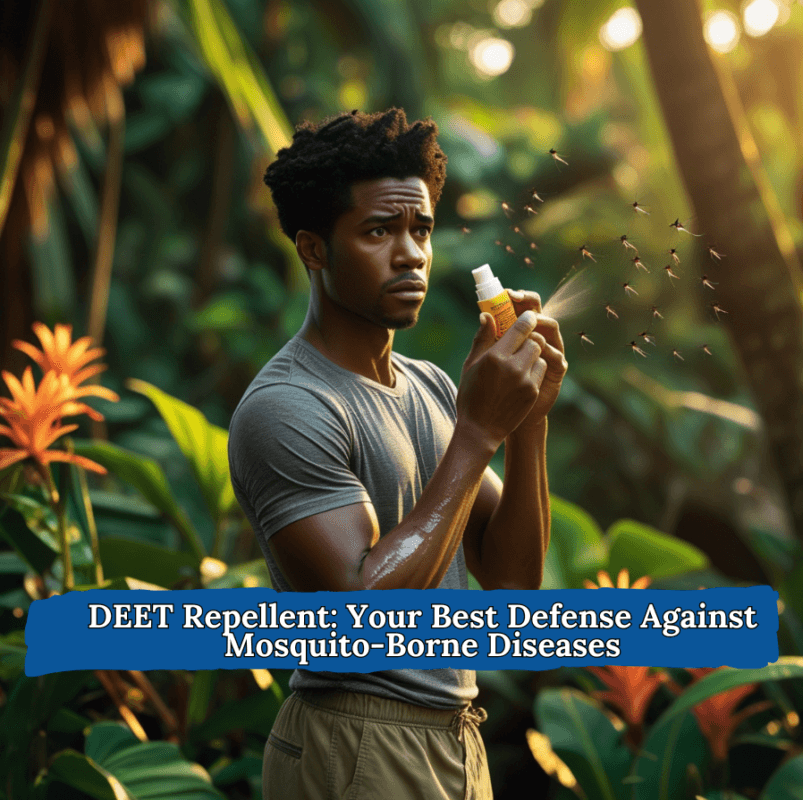Mosquito bites are more than just an itchy annoyance; they can carry serious diseases such as malaria, dengue fever, Zika virus, West Nile virus, and chikungunya. Whether you’re camping, traveling, or simply enjoying your backyard, choosing the right mosquito repellent is essential for protection.
One of the biggest decisions when selecting a mosquito repellent is whether to choose a DEET-based formula or a DEET-free alternative. While both aim to prevent mosquito bites, they differ in effectiveness, longevity, safety, and user experience.
What Is DEET?
DEET (N,N-Diethyl-meta-toluamide) is a synthetic chemical developed by the U.S. Army in 1946 to protect soldiers from insect bites. Today, it is one of the most widely used and scientifically tested insect repellents in the world.
How Does DEET Work?
DEET does not kill mosquitoes but confuses their sense of smell, making it difficult for them to detect and land on human skin. It creates a chemical barrier that makes humans “invisible” to mosquitoes.
Common DEET Concentrations
- 5%–10% DEET: Provides protection for about 1–2 hours.
- 15%–30% DEET: Provides protection for 6–8 hours.
- 50%–100% DEET: Provides protection for 10–12+ hours.
A 30% DEET concentration is typically recommended for balanced effectiveness and safety.
What Are DEET-Free Mosquito Repellents?
DEET-free repellents use alternative active ingredients to protect against mosquito bites. These alternatives can be synthetic or plant-based.
Common DEET-Free Active Ingredients
1. Picaridin
- Synthetic compound derived from piperidine (found in black pepper).
- As effective as DEET in repelling mosquitoes.
- Non-greasy, odorless, and safe for use on plastics.
- Lasts up to 8–12 hours.
2. Oil of Lemon Eucalyptus (OLE)
- Natural extract from the lemon eucalyptus tree.
- Contains para-menthane-3,8-diol (PMD), an effective mosquito repellent.
- Provides protection for 4–6 hours.
- Not recommended for children under 3 years old.
3. IR3535
- Synthetic amino acid-based repellent.
- Safe for children and pregnant women.
- Provides protection for 4–8 hours.
4. Essential Oils (Citronella, Peppermint, Lavender, etc.)
- Natural and pleasant-smelling alternatives.
- Less effective and requires reapplication every 1–2 hours.

Benefits of DEET-Based Mosquito Repellents
1. Highly Effective Protection
DEET is one of the most scientifically proven mosquito repellents, effective against mosquitoes, ticks, fleas, and biting insects.
2. Long-Lasting Defense
A 30% DEET formula lasts for 6–8 hours, while 100% DEET offers 12+ hours of protection.
3. Recommended for High-Risk Areas
Health organizations like the CDC and WHO recommend DEET in areas where mosquito-borne diseases are prevalent.
4. Safe When Used Correctly
The American Academy of Pediatrics (AAP) states DEET is safe for children over 2 months old in concentrations up to 30%.
5. Works Against Other Pests
DEET repels ticks, biting flies, chiggers, and fleas, making it ideal for outdoor activities.
Also Read:
- Why DEET Repellent is Essential for Travelers and Residents in High-Risk Countries
- DEET vs. DEET-Free Mosquito Repellents: Benefits, Differences, and How to Choose the Right One
- The Difference Between Chemical Burns from Bleaching Products and Sunburn: Dangers and Treatments
- Glycolic Acid vs. Salicylic Acid: Understanding the Key Differences
- Dangers of Skin Bleaching
Drawbacks of DEET-Based Mosquito Repellents
1. Can Cause Skin Irritation
Some people experience redness, itching, or irritation, especially with higher concentrations.
2. Greasy Feel and Strong Odor
DEET-based repellents can feel oily or sticky and have a distinct chemical smell.
3. Can Damage Synthetic Materials
DEET can dissolve plastics, sunglasses, watches, and synthetic fabrics.
Benefits of DEET-Free Mosquito Repellents
1. Gentle on Skin
DEET-free alternatives, especially plant-based ones, are ideal for sensitive skin.
2. No Damage to Fabrics or Plastics
Unlike DEET, DEET-free repellents won’t harm clothing, sunglasses, or synthetic materials.
3. Pleasant Scent and Feel
Many DEET-free options have mild, natural scents and do not leave a greasy residue.
4. Safer for Children and Pregnant Women
Options like IR3535 and picaridin are safe for young children and pregnant women.
Drawbacks of DEET-Free Mosquito Repellents
1. Requires Frequent Reapplication
Most DEET-free formulas last only 2–6 hours, requiring frequent reapplication compared to DEET.
2. Less Effective in High-Risk Areas
In regions with a high risk of mosquito-borne diseases, DEET-free options may not provide sufficient protection.
3. May Not Repel Other Insects
While DEET repels ticks, fleas, and biting flies, some DEET-free options only repel mosquitoes.



